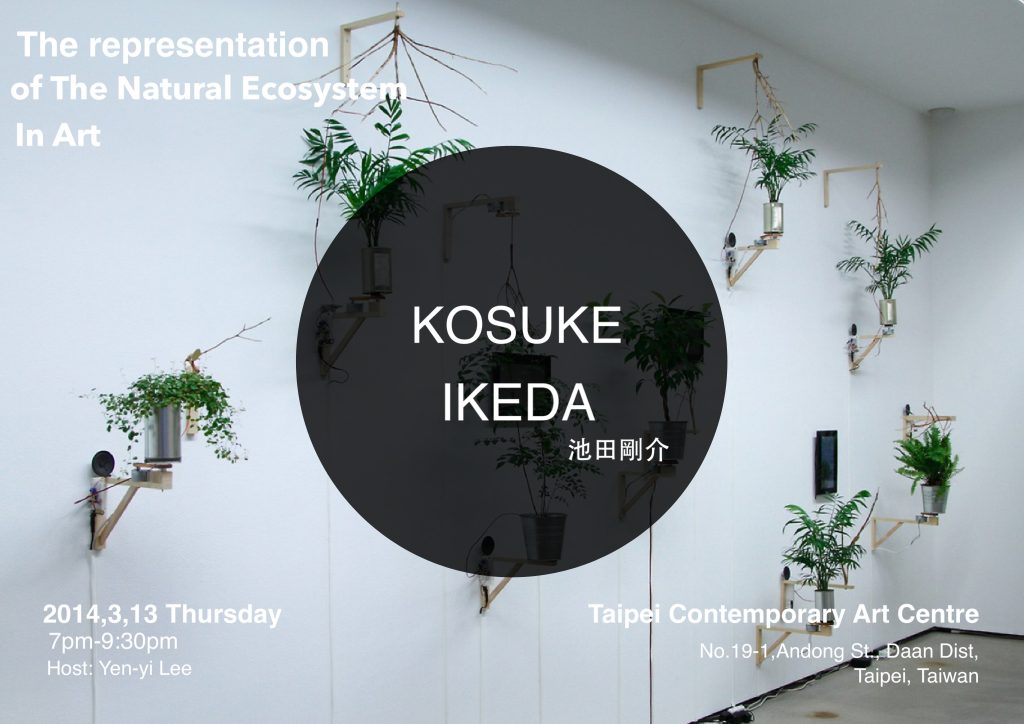2014 03. 13 池田剛介:以藝術再現自然界中生態系的互動 7pm – 9pm
2014 03. 13 Kosuke Ikeda : The representation of the natural ecosystem in Art 7pm – 9pm
(For English please scroll down)
(The speech is in Japanese, with Chinese interpretation. 演講以日文進行,備有中文翻譯)
池田剛介出生於1980年的日本福岡,於2005年自東京藝術大學獲得MFA藝術碩士畢業。他觀察自然界中的循環現象。他透過機械以產生能源的方式,使用生活周遭靜默的物件產生動作,以有感的方式傳達自然界中微妙的運行與現象。
自關東日本大地震之後,池田剛介去到受災地區做研究並進行藝術計劃,作品「東京藝術發電所」、「墨爾本藝術發電所」製作出能夠以替代方式生產能源的裝置, 同時對近代化所帶來的能源問題,與能源對於社會的影響,進而討論人類行為與自然活動的關係。
池田剛介的現地製作「福島物件的生態圈」目前正在台中國立台灣美術館,於數位方舟中「後福島的今天與我們的明天」展覽中展出。思考福島在台灣與世界各地,在核災後被標籤化的現象,當地的古老文化也在此情況下被忽視的現象。討論追求近代化與全球化至今所帶來的改變,以藝術作品提出為福島「再發電」的可能與想像別於現代化的可能。
與談人: 李彥儀
畢業於蘇格蘭愛丁堡大學藝術學院,MFA視覺文化碩士。
(Y)Lab是由旅英策展人李彥儀,於2013年成立於臺北的獨立策展體,我們以策展論述建構為途徑,同時建立亞洲新生代策展人相互交流的平台,致力與國際組織與藝術家合作。目前策展體以展覽為單位進行對長期策展計劃持續地進行討論與實驗。
更多資訊:
展覽 「後福島的今天與我們的明天」 2014/03/08 – 05/25
展覽場地:國立台灣美術館 數位方舟 http://artcomestoday.tumblr.com
展覽海報:http://p.tl/jl8M
福島核能廠爆炸之後,日本政府掩蓋事實,利用人民對當權者與專家的信心,大眾媒體被以經濟發展為名的財團操縱,失敗地扮演著不稱職的角色。原應提供真相與正確消息的媒體,不敵市場機制的挑戰,一敗塗地,失去監督批判的角色,成為金錢的宣傳影片。災難發生的當下,啞口無言的瞬間,地震不僅搖醒了更多疑問,更在回過神了的那一刻開始被迫消化現實:「之後要怎麼辦?」、「該做些什麼?」。因為不參與詢問,選擇相信當權成為讓市民自身惰於關心公眾事務,慵懶地遵循規則,消極面對社會運動,對於財團操弄社會表示無能為力,失敗地行使自身的公民權。
文學學者王德威曾經於《一九四九:傷痕書寫與國家文學》中提到:「在浩劫與書寫浩劫之間,在罹難者永遠的消音與倖存者綿綿的回憶之間,永遠有著難以跨越的鴻溝。」 但是棄之於不顧,當作沒這回事,並無法治癒創傷。我們自問到底要怎麼找出同情之外,消融兩造的之間的方法? 承認「失敗」並不簡單,但是更困難的是該如何去感知與回應與思考,我們是否能夠藉重新審視失敗的價值來觀察與研究此項與成功背道而馳的概念,將「失敗」一詞從負面價值觀中解離,成為一種單純,自然發生的狀態。
「後福島的今天與我們的明天」展並非悼念過去的錯誤,也非將所有希望寄於未來。而是藉由藝術家以誠實開啓與「現在(now)」對話的時刻,提醒著與常人生活脫節但是卻實際上存在的環境,如何在無法經歷切身情況下,或者可以輕易找出藉口的瞬間鼓起勇氣,改變自己的態度,挑戰歷史或政權所強賦於你的意識形態(ideology)。
2014 03. 13 Kosuke Ikeda : The representation of the natural ecosystem in Art 7pm – 9pm
Born in Fukuoku, Japan and after graduated from Tokyo University of Art as Master Fine Art, Kosuke Ikeda’s practice has been dealing with the circulation phenomenon that exists in the nature. His installations works often applies motor to generate energy so as to amplify the existence of these silent objects that convey the mild and almost invisible activities in the living world.
Since the 311 Tohoku earthquake, Kosuke Ikeda went to the affected area for research and began to work on the art projects such as using alternative ways to generate power in Tokyo Art-Power Plant and Melbourne Art-Power Plant for generating energy. Meanwhile discussing the energy problems comes with modernization, the effect of energy on the society, and the relationship between human behavior and the nature.
His site specific work “Ecosystem of Objects (Aizu-region, Fukushima) is now exhibiting in the Digital Ark of National Taiwan Museum of Fine Art as one of the participating artists of the exhibition “Tomorrow Comes Today”. Thinking about the fact that Fukushima is being labelled in Taiwan and worldwide after the nuclear disaster, which led to the result as the local culture being ignored and forgotten. Exploring the changes that accompanies with pursuing modernization and globalization, and to propose a hypothesis for modernization and “Re-generating” power for Fukushima.
Discussants :(Y)Lab
Recent graduate of University of Edinburgh, Edinburgh College of Art, MFA Visual Culture.
(Y)Lab is a curatorial collective founded in 2013 at Taipei City by independent curator, Yen Yi Lee. We are devoted to practice curatorial theory with series of discussions while establishing a platform for the young curators, artists, theorists based in Asia to exchange ideas and thoughts. Currently we have long-term ongoing projects which composed by exhibitions in order to push the series of contemporary art discussions and experiments further.
More Info:
“Tomorrow Comes Today” http://artcomestoday.tumblr.com
e-flyer : http://p.tl/jl8M
Exhibition time: 2014/03/08 – 05/25
Venue: Digiark, National Taiwan Museum of Fine Arts
“What has occurred cannot be altered, but we can change the future.” – Nuclear Power Expert, Koide Hiroaki
In the aftermath of the Fukushima Nuclear Power Plant explosion, the Japanese government covered up the facts and exploited the public’s trust in authorities and experts. Mass media fell under the control of business conglomerates with economic interests, and failed to perform its prescribed role. A media which was supposed to provide accurate and factual information was ultimately unable to resist the provocations of market mechanisms. They failed in their task keep watch and arbitrate, and became propagandalists for moneyed interests. Speechless at the moment of crisis, the earthquakes shook up even more questions. Once our faculties of reason returned, there was a compulsion to immediately digest reality: “What needs to be done in the aftermath” “What should be done?” By not participating in this line of questioning, and by choosing to trust those in power instead, citizens themselves became responsible for public affairs; they lazily follow rules, and passively confronted social movements. They were impotent in the face of social manipulation by business interests, and failed to exercise their rights as citizens.
In his book, The Lyrical in Epic Time: Chinese Intellectuals through the 1949 Crisis, literary scholar David Der-Wei Wang wrote: “there is an insurmountable chasm between holocaust and writing of holocaust, between the eternal silence of the victims and the endless recollections of the survivors.” But to abandon the task altogether and to act as though nothing has occurred does not help heal any wounds. Beyond reacting with sympathy, we ask ourselves how this divide between the two might be bridged. Admitting to defeat is no easy task, but harder still is finding appropriate ways to perceive, to respond, and to contemplate. Can we reevaluate failure and apply it in order to observe and study this event, and to conceptualize a path to success by moving in an opposite direction? Can we dissociate the word “failure” from its negative connotations so it becomes a simple, naturally occurring condition?
The Tomorrow Comes Today exhibition does not set out to mourn past mistakes, nor does it hold out hopes for the future. Rather it initiates a moment of honest dialog with what is “now” through the work of these artists. They remind us of environments that exist removed from ordinary lives, and demonstrate how, even when it is impossible to experience something firsthand, courage can be easily conjured as a momentary excuse that changes one’s attitude and challenges the ideologies that have been forced upon us by history and political regimes.

